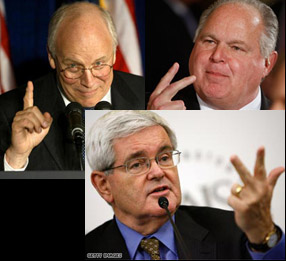Meet The Real RNC
Ignore the party, Rush, Newt and Cheney are the muscle
by Howard Fineman
May 20, 2009 | Updated: 9:14 p.m. ET May 20, 2009
Right now there are two RNCs here in Washington, side by side. The contrast is instructive. One, the Republican National Committee, is a clueless self-parody. The other, the (R)ush-(N)ewt-(C)heney tag team, is providing the real muscle as the Republican right begins to build traction in taking on President Obama and the Democrats.
The official RNC just spent the last two days wasting time and inviting ridicule—listening to a listless, empty speech by its chairman, Michael Steele, and debating the grand idea of calling the Democrats “socialists.” Meanwhile, Rush Limbaugh hammers away at the Democrats and the president on radio every day; Newt Gingrich sarcastically attacks Nancy Pelosi on The Daily Show (and gets laughs for doing so); and Dick Cheney continues his high-profile, Iraq-star media tour.
Steele kicked away his moment as leader of the party, failing even to launch a single credible attack line, let alone sketch a new strategic or tactical vision for the Republicans. Cheney—despite his deep and abiding unpopularity—has helped the GOP exploit the first true weak spot in the alliance of Obama and congressional Democrats: the question of how to handle the war on terror. In one sense, the issue has been presented, gift-wrapped, to the GOP. But while Steele has dithered, Rush, Newt and Cheney have latched on like the partisan pit bulls they are.
Barack Obama launched himself to power by promising to rethink—and vastly change—America’s approach to the war. But in the last several weeks, facing the grim realities of his role as commander in chief, he has been forced to backtrack, seeking a political middle course on defense and national-security policy. The president has accepted military tribunals; asserted the state-secrets defense in court cases; and reversed a decision to release photos of interrogation sessions that led to the prosecution of American soldiers. He has maintained parts of the Bush administration’s domestic-surveillance program, and refused to advocate a wholesale review of Bush-era polices on interrogation.
While those retreats have torn a few important pages from Obama’s earlier promises, the contributions from his Democratic allies on the Hill better resemble the work of a paper shredder. Speaker Pelosi has gotten ever more tangled up in her own Hermès as she has tried to explain what she did or did not know about the prior administration’s use of “enhanced interrogation techniques.” Her evolving version of events has been questioned widely, including by two leading members of Obama’s own team, CIA Director Leon Panetta and FBI Director Robert Mueller. And now Democrats in Congress have directly rebuffed the administration, joining Republicans in refusing to consider transferring Guantánamo terrorism suspects to prisons on U.S. soil.
Obama has a chance to regain control of the debate today, when he speaks at the National Archives. He will set forth his policy on Guantánamo (whatever it has become). In typical Obama fashion, he will try to work his way out of a jam by putting his decision in the largest possible philosophical context. (He did the same thing during the campaign when confronted by the crisis over the Rev. Jeremiah Wright: candidate Obama gave a sweeping speech on the history of race relations in American life.)
But even as Obama is speaking, who will be clearing his throat at a podium across town? Why, Dick Cheney, of course. The former vice president hasn’t singlehandedly created this situation, but he has adroitly capitalized on it. By relentlessly defending his record and promoting his views—keep Guantánamo open, use waterboarding, use all possible surveillance techniques—Cheney the Grim has helped create the fog of controversy now surrounding the White House.
That is what an opposition party does. Chairman Steele and the real RNC should take a look.
© 2009






























